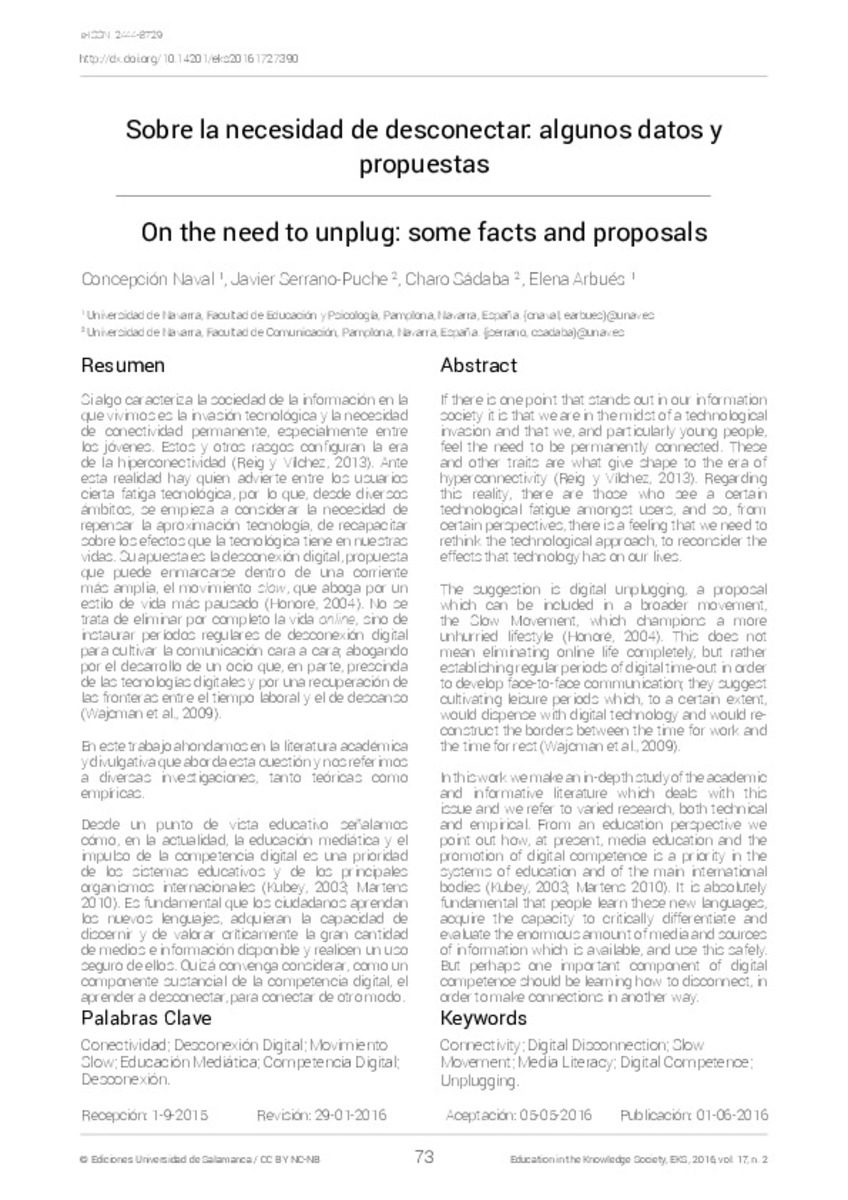Full metadata record
| DC Field | Value | Language |
|---|---|---|
| dc.creator | Naval, C. (Concepción) | es_ES |
| dc.creator | Serrano-Puche, J. (Javier) | es_ES |
| dc.creator | Sádaba-Chalezquer, C. (Charo) | es_ES |
| dc.creator | Arbués, E. (Elena) | - |
| dc.date.accessioned | 2016-09-07T11:23:09Z | - |
| dc.date.available | 2016-09-07T11:23:09Z | - |
| dc.date.issued | 2016 | es_ES |
| dc.identifier | 1138-9737 | es_ES |
| dc.identifier.citation | NAVAL C, SERRANO-PUCHE J, SÁDABA C, ARBUÉS E. Sobre la necesidad de desconectar: algunos datos y propuestas. Education in the Knowledge Society (EKS). 19 Jul 2016; 17(2): 73-90. | - |
| dc.identifier.issn | 1138-9737 | - |
| dc.identifier.uri | https://hdl.handle.net/10171/41534 | - |
| dc.description.abstract | If there is one point that stands out in our information society it is that we are in the midst of a technological invasion and that we, and particularly young people, feel the need to be permanently connected. These and other traits are what give shape to the era of hyperconnectivity (Reig y Vílchez, 2013). Regarding this reality, there are those who see a certain technological fatigue amongst users, and so, from certain perspectives, there is a feeling that we need to rethink the technological approach, to reconsider the effects that technology has on our lives. The suggestion is digital unplugging, a proposal which can be included in a broader movement, the Slow Movement, which champions a more unhurried lifestyle (Honoré, 2004). This does not mean eliminating online life completely, but rather establishing regular periods of digital time-out in order to develop face-to-face communication; they suggest cultivating leisure periods which, to a certain extent, would dispense with digital technology and would reconstruct the borders between the time for work and the time for rest (Wajcman et al., 2009). In this work we make an in-depth study of the academic and informative literature which deals with this issue and we refer to varied research, both technical and empirical. From an education perspective we point out how, at present, media education and the promotion of digital competence is a priority in the systems of education and of the main international bodies (Kubey, 2003; Martens 2010). It is absolutely fundamental that people learn these new languages, acquire the capacity to critically differentiate and evaluate the enormous amount of media and sources of information which is available, and use this safely. But perhaps one important component of digital competence should be learning how to disconnect, in order to make connections in another way. | - |
| dc.description.abstract | Si algo caracteriza la sociedad de la información en la que vivimos es la invasión tecnológica y la necesidad de conectividad permanente, especialmente entre los jóvenes. Estos y otros rasgos configuran la era de la hiperconectividad (Reig y Vílchez, 2013). Ante esta realidad hay quien advierte entre los usuarios cierta fatiga tecnológica, por lo que, desde diversos ámbitos, se empieza a considerar la necesidad de repensar la aproximación tecnología, de recapacitar sobre los efectos que la tecnológica tiene en nuestras vidas. Su apuesta es la desconexión digital, propuesta que puede enmarcarse dentro de una corriente más amplia, el movimiento slow, que aboga por un estilo de vida más pausado (Honoré, 2004). No se trata de eliminar por completo la vida online, sino de instaurar períodos regulares de desconexión digital para cultivar la comunicación cara a cara; abogando por el desarrollo de un ocio que, en parte, prescinda de las tecnologías digitales y por una recuperación de las fronteras entre el tiempo laboral y el de descanso (Wajcman et al., 2009). En este trabajo ahondamos en la literatura académica y divulgativa que aborda esta cuestión y nos referimos a diversas investigaciones, tanto teóricas como empíricas. Desde un punto de vista educativo señalamos cómo, en la actualidad, la educación mediática y el impulso de la competencia digital es una prioridad de los sistemas educativos y de los principales organismos internacionales (Kubey, 2003; Martens 2010). Es fundamental que los ciudadanos aprendan los nuevos lenguajes, adquieran la capacidad de discernir y de valorar críticamente la gran cantidad de medios e información disponible y realicen un uso seguro de ellos. Quizá convenga considerar, como un componente sustancial de la competencia digital, el aprender a desconectar, para conectar de otro modo. | - |
| dc.language.iso | spa | - |
| dc.rights | info:eu-repo/semantics/openAccess | - |
| dc.subject | Digital competence | - |
| dc.subject | Slow movement | - |
| dc.subject | Connectivity | - |
| dc.subject | Competencia digital | - |
| dc.subject | Movimiento slow | - |
| dc.subject | Conectividad | - |
| dc.subject | Desconexión digital | - |
| dc.subject | Educación mediática | - |
| dc.subject | Desconexión | - |
| dc.subject | Digital disconnection | - |
| dc.subject | Media literacy | - |
| dc.subject | Unplugging | - |
| dc.title | Sobre la necesidad de desconectar: algunos datos y propuestas | es_ES |
| dc.type | info:eu-repo/semantics/article | es_ES |
| dc.description.note | This is an open access article distributed under the Creative Commons: Atribution Noncomercial No Derivatives License (cc BY NC ND) | - |
| dc.identifier.doi | http://dx.doi.org/10.14201/eks20161727390 | - |
Files in This Item:
Statistics and impact
Items in Dadun are protected by copyright, with all rights reserved, unless otherwise indicated.






